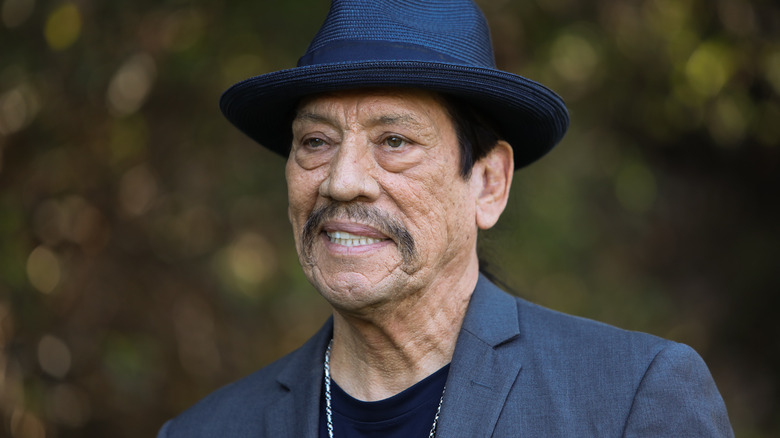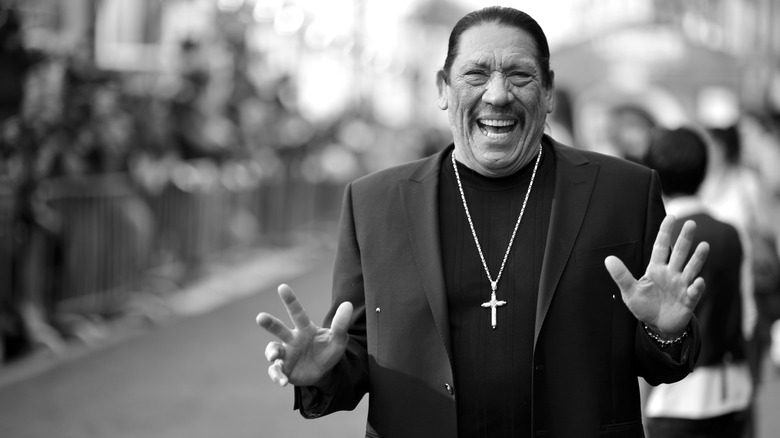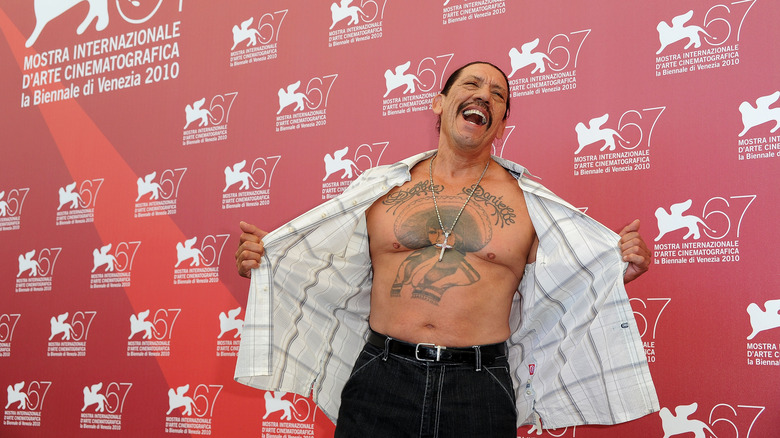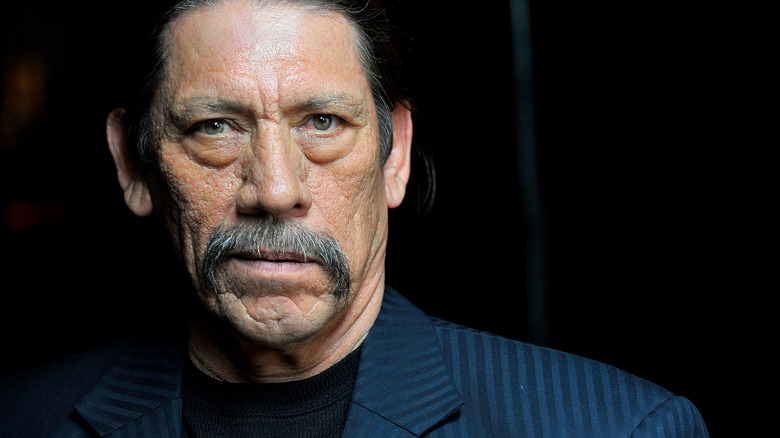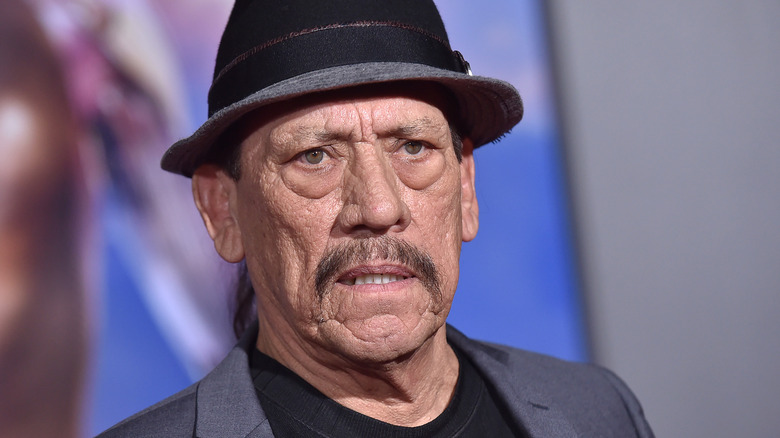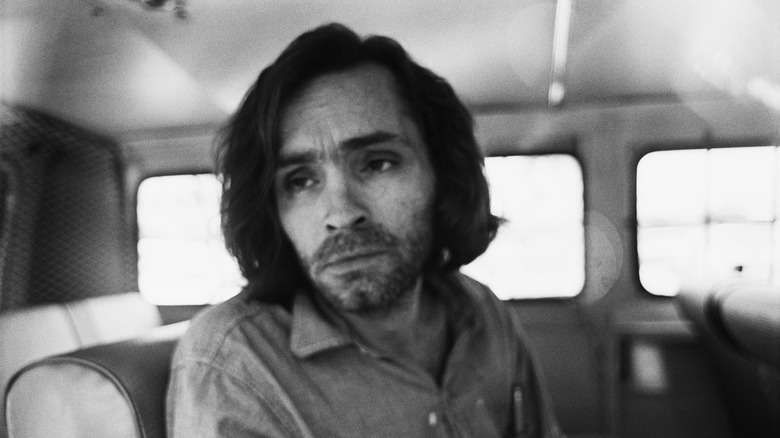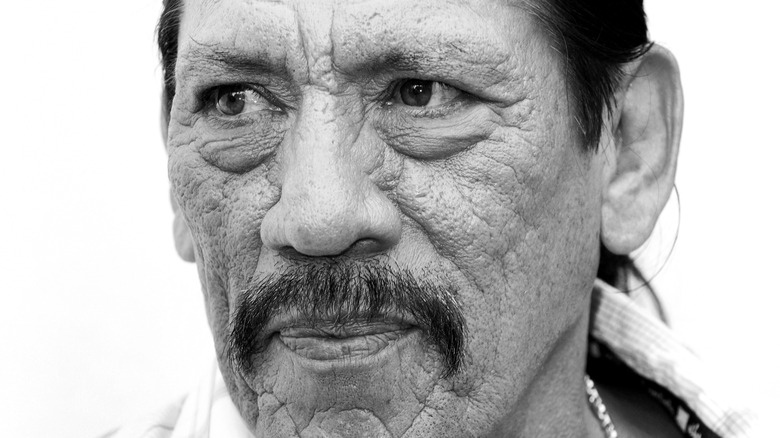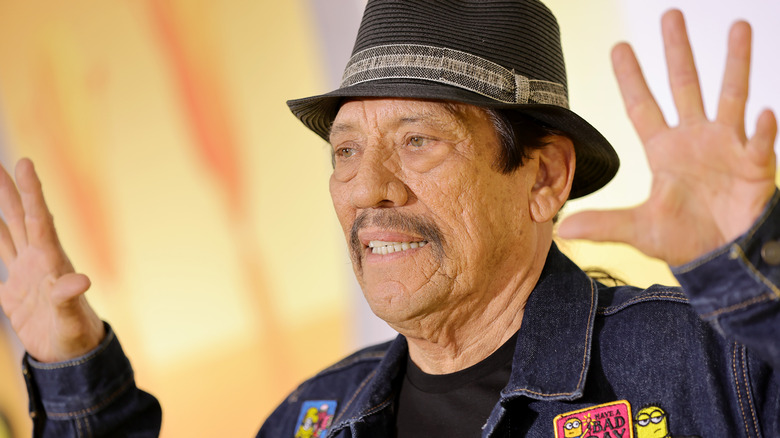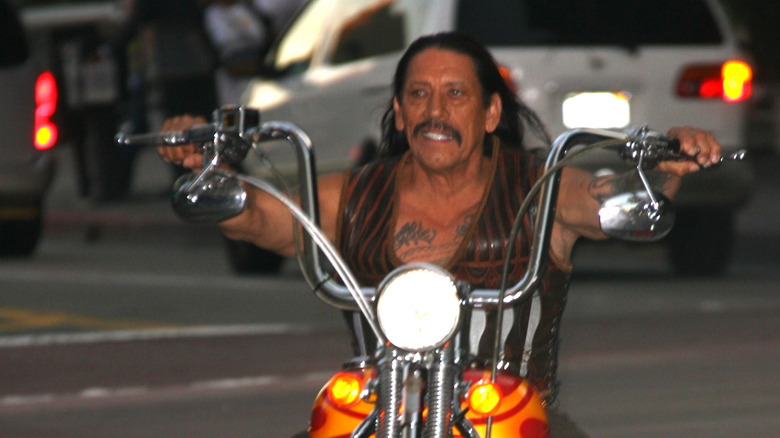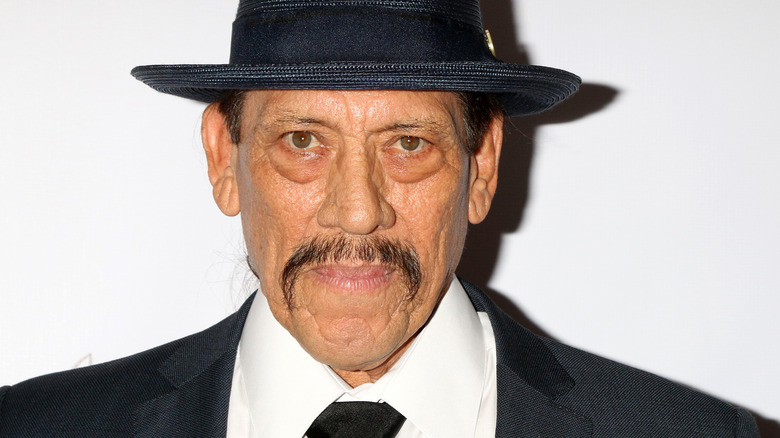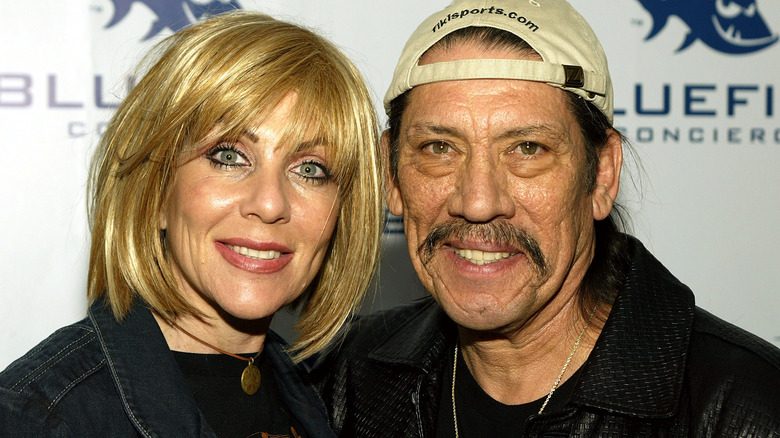Tragic Details About Danny Trejo
Danny Trejo didn't get all those distinctive scars in a bike accident. The Mexican-American actor and restauranteur, now a beloved, 77-year-old star of movies like "Blood In, Blood Out," "Con Air," "Spy Kids," "Machete," and more than 300 other films and TV shows, according to New York Post, knows exactly what it's like to be the gangsters he so often plays.
Born in Los Angeles in 1944, Trejo endured more hardships than almost any of his characters. He lived and fought in the streets, took and sold hard drugs, fought for his life against rival gangs with fists and pistols, spent hard time in multiple prisons, and even sat on death row before being released on a technicality. He then cleaned up his act, lucked into a Hollywood role in the '80s, and never looked back.
But it was a rough road getting there, and it hasn't been perfectly smooth sailing since. These are tragic details of Danny Trejo.
Trejo's uncle got him into drugs and crime
Like many tragic stories, Danny Trejo's begins with an abusive childhood. The documentary "Inmate #1: The Rise of Danny Trejo" (via film critics Reeling Reviews) describes how the "Machete" and "Breaking Bad" actor suffered serious abuse at the hands of his father and grandfather while growing up. This drove him closer to his Uncle Gilbert, who at least showed him some manner of affection and attention.
Unfortunately, his uncle wasn't exactly what you'd call a healthy influence during Trejo's formative years. Under his uncle's guidance, he got introduced to and hooked on drugs. And that doesn't just mean marijuana and a little LSD here and there. It means he started smoking pot at 8, as per Graceland, and was a full-fledged heroin addict before his 13th birthday. Uncle Gilbert also introduced Trejo to crime. The Grantland article says he recounted the following story to a crowd once: "I remember giving my uncle a ride in my mom's car ... He'd say, 'Stop here, lemme get some cigarettes.' [He] comes out: 'Go, go, go!' ... I'd say, 'You motherf*****! I'm in my mother's car!' But that was Gilbert. He could have $5,000 in his pocket and do a liquor store for $80."
Gilbert also turned Trejo into a fighter by simply beating him mercilessly and forcing him to stay on his feet or, in his words, "get my head beat in." Still a young teen, Trejo had a depressingly intimate and knowledgeable relationship with crime and street life.
If you or someone you know may be the victim of child abuse, please contact the Childhelp National Child Abuse Hotline at 1-800-4-A-Child (1-800-422-4453) or contact their live chat services.
Trejo fought ... a lot
You don't survive on the streets Danny Trejo grew up on without knowing how to defend yourself. According to Grantland, Uncle Gilbert made sure Trejo was tough by essentially ambushing the kid regularly, forcing him to keep up his guard and learn to strike back unless he wanted a split lip. "I was basically his punching bag," Trejo later commented.
Brutal as the training was, it did prepare Trejo for a life of crime and incarceration (and, later on, an acting career). It also prepared him for life in his corner of Los Angeles, where warring street gangs bare-knuckle brawled over turf, like Mission Park. There, Trejo learned that everyone is tough, but not everyone is scary. "People ain't afraid of tough guys," he said. "People are afraid of crazy guys."
Benny "the Jet" Urquidez, a champion kickboxer, occasionally fought alongside Trejo in this period. "Danny never backed down," he said. "He was a natural. He had a big heart, and a strong jaw." Speaking to Tony Gonzalez, Trejo describes the endless physical threats and demands of growing up in Los Angeles's Echo Park, which he says was "basically a ghetto." "It was trouble," he says. "We were from EP (Echo Park) and we always used to fight with the Temple Street gang and it was just chaos all the time. You fight on the way to school, you fight on the way home and you had to keep people out of your neighborhood which was ours."
Trejo became a serious criminal at a young age
According to The Lip TV, Danny Trejo was a heroin user by age 12 — when most kids are riding bikes and thinking about high school. In fact, he'd already done hard time by that point, having been arrested at the ripe old age of 10 for assault and battery.
But he was just getting started. Those street gang fist fights soon involved firearms, and Trejo was right in the thick of it, firing handguns from rolled down windows during drive-by, car-on-car shootouts. And those weren't the only dangerous weapons of war he used during his period as a Los Angeles gangbanger. At different points, he robbed liquor stores with actual hand grenades. Don't ask where he got those, but clearly the folks he was running with had hook ups to all sorts of illicit stuff Trejo used to supply his criminal activity.
Trejo remarked, thinking back on that period (as excerpted by Huffington Post), "We had a lot of pistols, and you don't really want to mess with somebody who's got a lot of pistols." Years of abuse at the hands of his parents and the terrible influence of his Uncle Gilbert had hardened him into a truly frightening, hardline criminal by the time he was barely old enough to be getting his first girlfriend and trying to pass his driving test. Unsurprisingly, prison time wasn't too far off.
Trejo did time in multiple prisons
Danny Trejo's lifestyle of drug use, narcotics dealing, street fighting, and general crime could have only led to death or prison. Luckily, it was the latter, but he didn't realize how fortunate he was at first.
According to Texas Monthly, Trejo spent 11 years total in various penitentiaries throughout the southwest. He spent some brief time in prison in 1962 for drug dealing and robbery. He got out before too long, but was back in the slammer by 1965, this time for the long haul, after selling four ounces of heroin (he maintains it was sugar, according to the article) to a fed posing as a dope fiend. The grueling experience would eventually shape him into the man he is today, but it wasn't exactly what you'd call an overnight process. He was still a hard criminal who wasn't easy to scare.
But that was about to change. In 1968, he was moved from Soledad to San Quentin, known for its execution chambers. According to the article, Trejo's jovial demeanor changed when the subject shifted to the first time he saw the place up close. "When you pull up to San Quentin, you see two lights up on top of the North Block ... You see a red light and a green light. If the red light is on, that means they're killing someone ... That's the first thing you see, so you know this is a death house — people come in here and don't come out."
Trejo met Charles Manson in prison
Daily Mail has details on "Trejo: My Life of Crime, Redemption, and Hollywood," Danny Trejo's 2021 autobiography. Turns out, Trejo wasn't the only high-profile name at some of the joints he did time in. At the age of 17, while serving time in the Los Angeles county jail in 1961, he met Manson family namesake and cult leader Charles Manson, then 26. Trejo wasn't particularly impressed with the guy, describing him as so poor he needed a piece of string to keep his pants up because he couldn't afford a belt. "I felt sorry for him. It was clear the only shower the man was ever going to have was the one he was going to get in jail."
Furthermore, Manson wasn't what you'd expect from a future notorious mastermind behind the infamous Manson murders. "When we first met him," Trejo says, "it was before all that stuff, okay? He was like a 5ft, slick little wimp. He wasn't a bully. Wasn't a thug. But he had the jargon of prison and jail." Of course, Manson was no poser. Two years later, in 1963, he had three of his most loyal, brainwashed underlings carry out the brutal killings of actress Sharon Tate and five other innocent people inside the home of producer Terry Melcher.
Although Trejo wasn't likely headed towards ritualistic sacrifice, the episode is something of a reminder of the violent, criminal path he might've gone down if he didn't get his act together.
Trejo was briefly on death row
Texas Monthly says that Danny Trejo was moved to San Quentin State Prison, known for its high profile inmates like Charles Manson, as well as for its execution chambers, in 1968. Shortly afterwards, a riot broke out. He didn't start it, but he didn't shy away either, eventually hurling a small rock that struck a prison guard in the head. Trejo insists he didn't mean to hit the guard, but he does take responsibility for the kind of man he was at the time, saying, "You can become a bit of a sociopath [in prison], and I think I just stopped caring."
This incident got him moved to solitary confinement, where he passed the time by recalling his favorite movies, like "The Wizard of Oz," over and over in his head.
The Huffington Post summarizes a 1988 documentary in which Trejo said, more than 20 years after that dark day, "I was sitting in the hole, and it's like I knew, it's all over ... It's just done, I'm through. I'm 24 years old and I'm through." It was then and there that he tried praying for the first time. He told The Guardian, "I went to the hole looking at the gas chamber offenses ... and I remember saying: 'God, if you're there, everything will turn out the way it's supposed to. If you're not, I'm f*****.'" Although he didn't expect to get out of this situation, the charges were ultimately dropped. By 1969, Trejo was a free man.
Finding a post-prison future was tough for Trejo
Danny Trejo had lived the first 25 years of his life as a criminal, and by 1968 he was awaiting execution for wounding an officer during a prison riot. Then, as Texas Monthly points out, the lack of witnesses willing to corroborate the charges against him resulted in him being released in 1969.
Trejo was free. But he lacked any prospects or direction for the future. Many men in that position just return to what they know: a life of crime. But not Trejo. Believing his prison prayers had worked, he was determined to stay on a clean path. He returned to Los Angeles and made cash from landscaping and boxing matches. At the same time, he started volunteering at a local clinic, helping drug addicts on their own paths to recovery. It's something he still does part time, telling The Guardian, "Even now, kids come up and say: 'Trejo, what's up? You helped me years ago.' So that's been a blessing."
It was fulfilling work. But still, Trejo needed a long term plan. It would come from the last place he expected. In 1984, he was sponsoring a former fellow inmate who'd found work in acting. When Trejo went down to the set of 1984's "Runaway Train," to encourage him away from relapsing, the director noticed him. Believing Trejo would be perfect in his movie, he cast him as a boxer. It was his first acting role. But it wouldn't be his last.
Trejo has been typecast as a criminal
Once he became a known actor in Hollywood, Danny Trejo's hard-boiled authenticity got him plenty of roles as gangsters, criminals, assassins, and the like. Texas Monthly points out that Trejo's rough appearance made him an ideal bad guy. You don't need three scenes of expository dialogue to learn a guy like Trejo is bad news; his scars, tattoos, and gruff demeanor do the talking for him. On with the plot.
"I am a mean Mexican guy with tattoos," he said, according to the article, when asked if he resented being typecast. It's understandable that a guy who's been through what Trejo has, and was saved by a lifeline as cool as acting, would be thankful for whatever he can get even years later. In the beginning, though, he didn't quite understand what was happening. "I didn't know I was being stereotyped," Trejo told Biz Times. "I just knew I was working."
But his hard living did more for his movie career than merely providing the face of Bad Guy #6. As unexpected as a future in Hollywood was for a once-imprisoned gangbanger, Trejo insists he wasn't entirely inexperienced when he started acting. He wrote in his book, "Trejo," "Acting wasn't new to me. I'd acted to survive my childhood. I'd acted like I wasn't scared when I was terrified. In Folsom, I acted to keep my sanity. I had to move; I had to speak out loud; I had to hear my own voice."
Trejo battled liver cancer in secret
Survivor Net says that in 2010, Danny Trejo was diagnosed with dangerous liver cancer. Despite his early years of hard living and age, he wasn't expecting any diagnosis, claiming to have tried to stay healthy over the years. He told The Sun, "You know cancer doesn't discriminate. You can be healthy, but it'll still get to you ... I had a 10 centimetre tumour in my liver and they said it was too big to start chemo."
It's hard enough getting a diagnosis like that. It's another thing to have to keep the news to yourself and your immediate circle. Trejo told the publication that he was reluctant to go public with the disease because he'd just signed onto some lucrative movie deals. "The bad part was I had about six contracts already signed and I was making major money. And so I couldn't tell anybody that I had cancer. I always say I had just suffered in silence." But Trejo also said he didn't allow himself to wallow in self pity. "At first I thought 'God why me?'" He said. "Then the thought hit me, 'B***h how would you like to be 12 years old and have cancer?'
Luckily, the chapter is well behind him. He continued, "So they gave me injections right into the tumour, three times, seven needles and boom. So anyway, the third time, after about six months, I came back and they said, 'You're cancer free.'"
Trejo hasn't had the best luck with marriage
Danny Trejo might not look like Brad Pitt. But as a multimillionaire Hollywood bad boy with a heart of gold, he hasn't exactly had trouble attracting women over the years. Thing is, attracting women and being a good husband are different skill sets.
HITC has details on the different women of Trejo's past, and which of his five kids were born with which one. Danielle and Gilbert were from his marriage to fellow actor Debbie Shreve ("High Hopes" and "Tennis, Anyone?" ), to whom he was hitched from 1997-2009 (pretty long for Hollywood). Danny Boy, Esmeralda, and Jose are from various ex lovers, but there's not much publicly verifiable information about the kids or the women, aside from the fact that one of the women was named Maeve.
In an interview with Screen Rant, Trejo says he spoke to Maeve before releasing his autobiography, "Trejo: My Life of Crime, Redemption, and Hollywood." Among the topics of discussion was the role his absent parents played in his marital success (or lack thereof). "Why do you think you've been married and divorced four times?" he says of himself. "Why do you think you've had children with women you weren't married to? That's all part of it! She said, 'I walked into your mother's house when your son Gilbert was born. I've never been in a colder place in my life!'"
